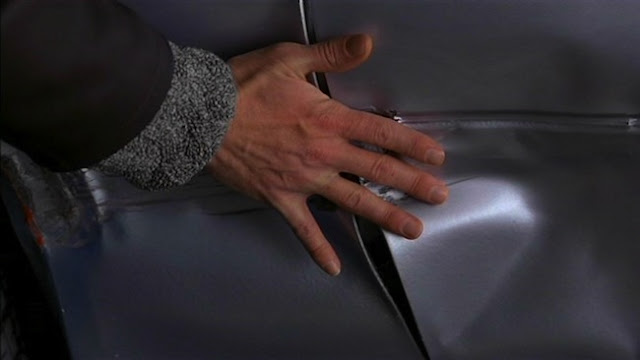Opening wide
In our world of manufactured "reality" television and an appetite for memoir, some things have remained trade secrets, and for good reason. (Bloggers, their lovers and their fathers, often live to regret online indiscretion.)
But 30-year-old French Laundry-trained "avant-garde" chef Grant Achatz, lauded as chef-partner of Trio, including a 2003 "rising Star Chef" nod from the James Beard Foundation, has chosen to let the sun shine onto his new project, Alinea, on the eGullet foodie website, since mid-August, with interactive glimpses of his "food lab" where the menu is being refined, down to the style of tableware. (An "alinea" is a symbol for the start of a paragraph: ¶.)
Starting with the meeting of globetrotting entrepreneur and epicure Nick Kokonas, the narrative's laid out like a mouth-watering movie trailer. Kokonas writes, "I think a lot people come to a chef with their pre-existing vision of the restaurant they want to build. I didn't even want to build a restaurant before I saw his vision." His vision? "To create the container in which we create the experience," he told eGullet readers. "I think that's the very exciting thing for me that I've never been able to have a part in."
Groundwork? "Nick and Grant drove down every street within a chosen geographical band, armed with a giant map and a set of green, yellow and red markers. Once they had found a set of acceptable streets, they asked a realtor to show them every space available on them."
And time's available, too: "Instead of populating Alinea's menu with previous favorites from Trio or 'trial' dishes that have been only roughly tested, Grant and his team will take six months [with kitchen staff on salary] to devise, develop and perfect the dishes and delivery modes that will appear on Alinea's opening menu."
Readers want to know about financing and partnerships. Achatz wants to talk about "identity." "After looking at several restaurant's logos, I became even more at a loss as to what a logo is." The site's studded with an exactingly detailed, almost Socratic questioning of cookware and kitchen arts, and of "identity as an ever-changing process more than as a static object, something deeply historical and contextual—that is to say, as rooted in the moment and the place (neither of which are static, though we pretend that both are)." After de-and-reconstructing notions about "transcending the plate," Achatz weighs in with 1,700 words about the preliminary kitchen design, promising to upload blueprints. It's a specialized audience that can prompt, "Could you possibly elaborate just a little on the make and model of the centrifuge?" There's a lot of give-and-take, and just a little of what a Twin Cities reader wrote of the online project: "Are we the privileged or what?"
[Newcity, 21 October 2004]
But 30-year-old French Laundry-trained "avant-garde" chef Grant Achatz, lauded as chef-partner of Trio, including a 2003 "rising Star Chef" nod from the James Beard Foundation, has chosen to let the sun shine onto his new project, Alinea, on the eGullet foodie website, since mid-August, with interactive glimpses of his "food lab" where the menu is being refined, down to the style of tableware. (An "alinea" is a symbol for the start of a paragraph: ¶.)
Starting with the meeting of globetrotting entrepreneur and epicure Nick Kokonas, the narrative's laid out like a mouth-watering movie trailer. Kokonas writes, "I think a lot people come to a chef with their pre-existing vision of the restaurant they want to build. I didn't even want to build a restaurant before I saw his vision." His vision? "To create the container in which we create the experience," he told eGullet readers. "I think that's the very exciting thing for me that I've never been able to have a part in."
Groundwork? "Nick and Grant drove down every street within a chosen geographical band, armed with a giant map and a set of green, yellow and red markers. Once they had found a set of acceptable streets, they asked a realtor to show them every space available on them."
And time's available, too: "Instead of populating Alinea's menu with previous favorites from Trio or 'trial' dishes that have been only roughly tested, Grant and his team will take six months [with kitchen staff on salary] to devise, develop and perfect the dishes and delivery modes that will appear on Alinea's opening menu."
Readers want to know about financing and partnerships. Achatz wants to talk about "identity." "After looking at several restaurant's logos, I became even more at a loss as to what a logo is." The site's studded with an exactingly detailed, almost Socratic questioning of cookware and kitchen arts, and of "identity as an ever-changing process more than as a static object, something deeply historical and contextual—that is to say, as rooted in the moment and the place (neither of which are static, though we pretend that both are)." After de-and-reconstructing notions about "transcending the plate," Achatz weighs in with 1,700 words about the preliminary kitchen design, promising to upload blueprints. It's a specialized audience that can prompt, "Could you possibly elaborate just a little on the make and model of the centrifuge?" There's a lot of give-and-take, and just a little of what a Twin Cities reader wrote of the online project: "Are we the privileged or what?"
[Newcity, 21 October 2004]
